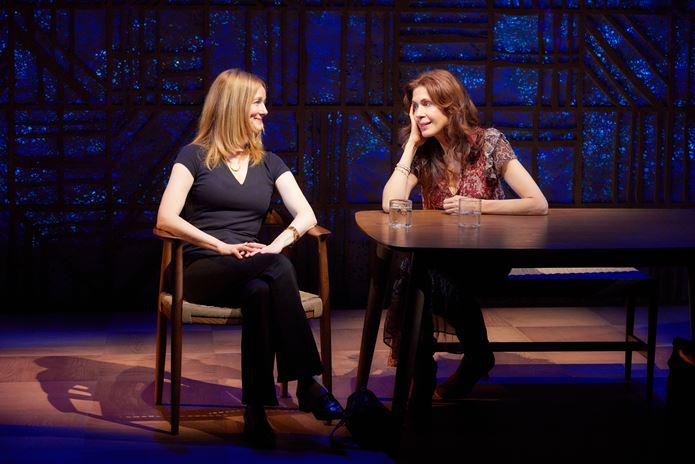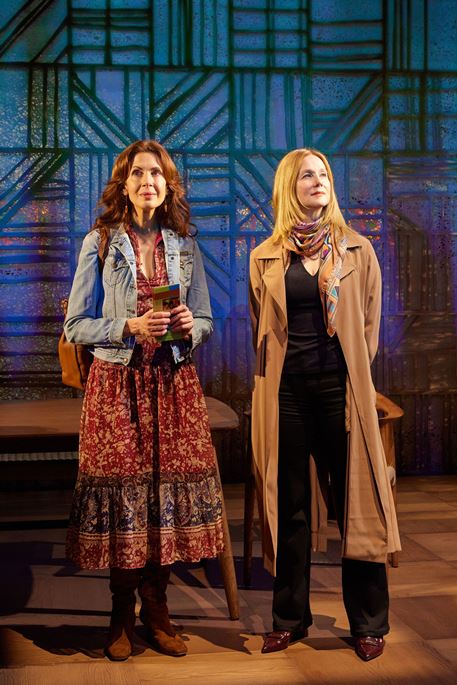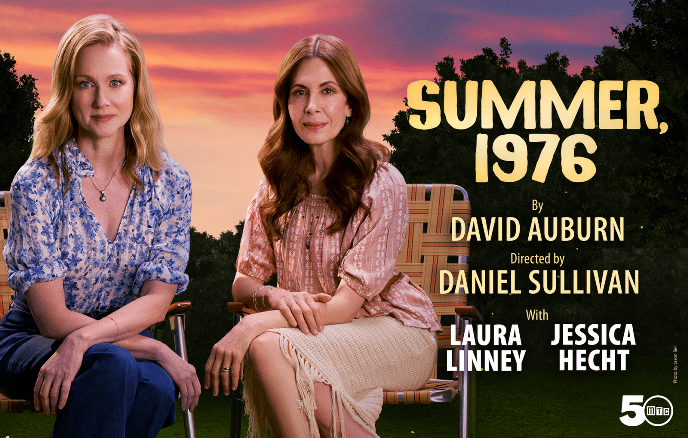Commissioned and produced by Manhattan Theatre Club in a world-premiere Broadway engagement at the Samuel J. Friedman Theatre, Pulitzer Prize-winning playwright David Auburn’s Summer, 1976, directed by Daniel Sullivan, offers a decidedly old-fashioned and patronizing male perspective on the mundane lives of two mothers in Columbus, Ohio, whose young daughters formed a friendship that caused them to spend some time together for a few months during America’s Bicentennial. Apparently, the Women’s Liberation Movement, which began around 1967, and was in full force for a decade, had passed them by in the Midwest.

Featuring the star power of Laura Linney and Jessica Hecht, the two-hander is presented in the format of alternating direct-address storytelling, as the characters share their common memories and divergent opinions while seated or standing at a long dining room table. It’s a lot of talk and little action, animated only by the emotive voices, facial expressions, sideways glances, and body language of the top-notch actresses.
Diana, played by Linney, is an artist, professor, and single mom to Gretchen living on family money, with a firm, controlling, and insulting demeanor, an upscale look and meticulous taste, articulate speech and a superior attitude; Alice (Hecht) is a free spirit, in hippie-style dress and boots, with disjointed thoughts and a joint in her pocketbook, and a messy home where she lives with her tenure-track husband Doug (imitated first by Alice, then by Diana) and their daughter Holly. Both deliver the sardonic laughs (mostly of the women disparaging one another), as the two note that they really didn’t like each other but, despite their obvious differences, ended up spending much of that summer together, seemingly out of necessity and unhappiness, until they didn’t.

As they get to know each other – largely through Doug’s failed (by way of the ditzy Alice) invention of a baby-sitting co-op with shares in coupons that the members can use as payment to their neighbors for watching their kids – they find that their lives aren’t exactly what they’ve claimed or hoped them to be. The troubles and revelations come slowly, Diana teases us with her fantasy of what they’d become, and they accidentally bump into each other again in NYC decades later, go their separate ways after an awkward wait for a taxi, then recount their memories of foiled relationships, motherhood, and ambition – the outdated stereotypical female troubles from their earlier days.
John Lee Beatty’s set features a sleek and static mid-century design with minimal furnishings, supported by Hana S. Kim’s occasional projections. Costumes by Linda Cho clearly distinguish between the contrasting types and tastes of Diana and Alice, lighting by Japhy Weideman, sound by Jill B.C. DuBoff, and original music by Greg Pliska suggest the moods and locales.
In the end, Summer, 1976 shows us little character development, true insight into the era, or good reasons as to why this would have been such a memorable time for these women, aside from the fireworks on Independence Day. We are left to wonder if their brief encounter truly changed them, or if they would have ended up where they did anyway.
Running Time: Approximately 90 minutes, without intermission.
Summer, 1976 plays through Sunday, June 18, 2023, at Manhattan Theatre Club, performing at the Samuel J. Friedman Theatre, 261 West 47th Street, NYC. For tickets (priced at $84-338, including fees), call (212) 239-6200, or go online. Masks are required for all Tuesday evening and Sunday matinee performances.






Wow – this review seems overly harsh! I absolutely loved the play – the Summer of 1976 was very memorable and everything about the play rang true for me. Acting was incredible and I thought the characters did grow and change over that summer. All and all, I was enthralled by both story and performances.
Yes, the acting was excellent, but, as someone who grew up in NYC during feminist times, the story and characters seemed to me to be very outdated for 1976.